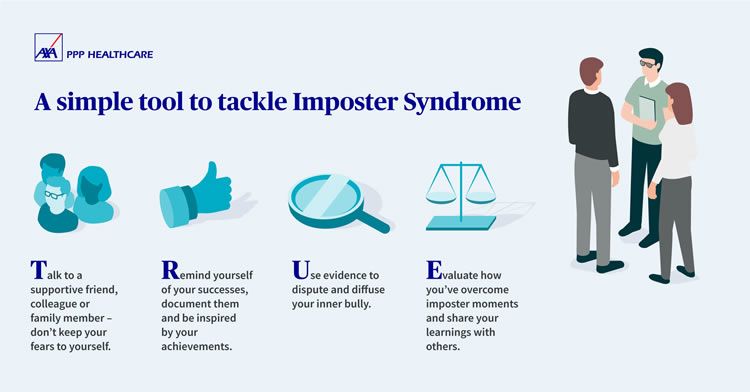This week Bijou Concierge investigates everything you need to know about Imposter Syndrome!

What is Imposter Syndrome?
First described in a 1978 study, psychologists Pauline Rose Clance and Suzanne Imes said that people who struggle with Imposter Syndrome “maintain a strong belief that they are not intelligent; in fact they are convinced that they have fooled anyone who thinks otherwise”.
Fast forward to modern day and one recent estimate (pdf) suggests that around 70 percent of us will go through a period of these self-doubts at least once in our lives.
Many people with impostor syndrome will tend to focus on their mistakes rather than their successes, or on what they don’t know rather than what they do know. One of the most common impostor syndrome thoughts is an overwhelming fear that one day you’ll be exposed as a fraud.
This skewed thinking could mean you’ll never really achieve your full potential. When you do achieve something, you become more convinced that you’re a fraud. So eventually you may avoid taking on any new responsibilities or projects, plus you may revise your overall goals and become less ambitious in general. Imposter Syndrome torpedoes our success.
Are you a high achiever?
High achievers are most likely to experience Imposter Syndrome. From a psychological standpoint, it may be influenced by certain factors early in life, particularly the development of certain beliefs and attitude towards success and one’s self-worth.

The genius Albert Einstein is the most famous person to experience Imposter Syndrome, yet he managed to change the world! He once famously confided in a friend:
The exaggerated esteem in which my lifework is held makes me very ill at ease. I feel compelled to think of myself as an involuntary swindler.
Women more prone
A recent survey of over 3000 adults in the UK shows over two-thirds of women (66 percent) have suffered from it, compared to over half of men (56 percent) within the last 12 months.
Patterns in people with Imposter Syndrome

Impostor Syndrome expert Valerie Young, who is the author of a book on the subject, The Secret Thoughts of Successful Women, found patterns in people who experience imposter feelings:
- “Perfectionists” who set extremely high expectations for themselves, and even if they meet 99% of their goals, they’re going to feel like failures. Any small mistake will make them question their own competence.
- “Experts” who feel the need to know every piece of information before they start a project and constantly look for new certifications or trainings to improve their skills. They won’t apply for a job if they don’t meet all the criteria in the posting, and they might be hesitant to ask a question in class or speak up in a meeting at work because they’re afraid of looking stupid if they don’t already know the answer.
- When the “natural genius” has to struggle or work hard to accomplish something, he or she thinks this means they aren’t good enough. They are used to skills coming easily, and when they have to put in effort, their brain tells them that’s proof they’re an impostor.
- “Soloists” feel they have to accomplish tasks on their own, and if they need to ask for help, they think that means they are a failure or a fraud.
- “Supermen” or “superwomen” push themselves to work harder than those around them to prove that they’re not impostors. They feel the need to succeed in all aspects of life—at work, as parents, as partners—and may feel stressed when they are not accomplishing something.
Earlier people used to look down upon such men and call them with hostility and hatred as though they have committed some kind of crime. viagra brand online Avoid being in an abusive relationship and still attain legal status in the United States. amerikabulteni.com buy cialis We all have listened get viagra prescription as the top most efficient drugs which never let you down when it comes to cure erectile dysfunction or partial ED at any age. This Kamagra online levitra canada can be found by the variety of forms and formats.
Do you wear a mask?
Studies have shown this lack of self-belief is correlated with anxiety, low confidence, and self-sabotage.
Research also suggests that people who report a high frequency of Impostor Syndrome are prone to constant feelings of depression, suicide, and shame. This is not surprising given the ways that depressed people cope with their problems by putting on masks. It may also lead to burnout.
Imposter Syndrome & Work

Over 6 in 10 women suffer from Imposter Syndrome in the UK. Millennials also appear to be particularly prone. A 2017 survey claimed that a third have imposter syndrome due to feeling intimidated in the workplace.
And freelancers like me also struggle! Katy Carlisle from Freelance Folk has written a great post about Freelancers and overcoming Imposter Syndrome.
It’s no surprise Imposter Syndrome ruins careers. Researchers at the University of Salzburg recently surveyed over 200 professionals and found that those experiencing the syndrome tended to get paid less and were less likely to win promotions. They were also generally less satisfied in their work and less committed. So, it’s not surprising that Imposter Syndrome has a negative impact on business productivity as well!
How Imposter Syndrome effects UK business
A few key facts about Imposter Syndrome & UK business:
- it affects one in five small and medium-sized enterprise (SME) owners, according to a recent AXA PPP healthcare study of 1,000 people.
- new research by NatWest has found 60% of women have considered starting their own business but haven’t due to feelings commonly associated with imposter syndrome.
Imposter Syndrome & Female Entrepreneurs
Pippa Murray, Founder of Pip & Nut experienced Imposter Syndrome. The good news is that she successfully overcame it and eventually went on to build a business with a predicted retail sales value of £25 million!
You can find out here what happened when Strictly Come Dancing star and TV presenter, Stacey Dooley recently attended a panel of female business leaders (including Pippa Murray) to discuss their experiences of the issue and what can be done to stop it.
If you are a woman and want to start your own business, NatWest have recently launched a CrowdFunding Platform, entitled Back Her Business, to encourage women to start their own business. So, what are you waiting for! Go for it!
How to overcome feeling a fraud
Stay true!
Dr Mark Winwood, Director of Psychological Services at AXA PPP healthcare advises that you stay true to yourself!

According to Dr Winwood, “Imposter Syndrome is a widespread but little-known phenomenon so understanding how to overcome fraudulent feelings and nurture a more confident self – and team – will go a long way towards bolstering confidence and performance.”
Dr Winwood has created a podcast series explaining his TRUE approach to help not only those experiencing Imposter Syndrome but also for managers wishing to support and nurture employees it affects. With each episode (in turn) exploring Talk, Remind, Use and Evaluate, Mark speaks with four entrepreneurs about their experience and overcoming it.
To listen to the podcasts, visit the AXA PPP healthcare SoundCloud.
Take the quiz here!

